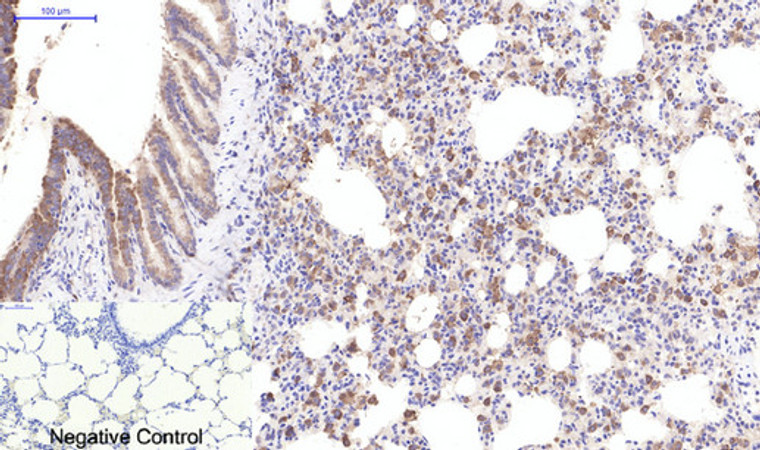-
Western blot analysis of lysates from 293 cells, treated with TNF-a 20ng/ml 30', using Notch 2 (Cleaved-Asp1733) Antibody. The lane on the right is blocked with the synthesized peptide.
-
Western blot analysis of 293 cells using Cleaved-Notch 2 (D1733) Polyclonal Antibody diluted at 1:500
-
Immunohistochemistry analysis of paraffin-embedded human brain tissue, using Notch 2 (Cleaved-Asp1733) Antibody. The picture on the right is blocked with the synthesized peptide.
-
Immunohistochemical analysis of paraffin-embedded Mouse-kidney tissue. 1, Cleaved-Notch 2 (D1733) Polyclonal Antibody was diluted at 1:200 (4°C, overnight). 2, Sodium citrate pH 6.0 was used for antibody retrieval (>98°C, 20min). 3, Secondary antibody was diluted at 1:200 (room tempeRature, 30min). Negative control was used by secondary antibody only.
-
Western blot analysis of various cells using Cleaved-Notch 2 (D1733) Polyclonal Antibody diluted at 1:500
-
Immunohistochemical analysis of paraffin-embedded Rat-spleen tissue. 1, Cleaved-Notch 2 (D1733) Polyclonal Antibody was diluted at 1:200 (4°C, overnight). 2, Sodium citrate pH 6.0 was used for antibody retrieval (>98°C, 20min). 3, Secondary antibody was diluted at 1:200 (room tempeRature, 30min). Negative control was used by secondary antibody only.
-
Immunohistochemical analysis of paraffin-embedded Mouse-lung tissue. 1, Cleaved-Notch 2 (D1733) Polyclonal Antibody was diluted at 1:200 (4°C, overnight). 2, Sodium citrate pH 6.0 was used for antibody retrieval (>98°C, 20min). 3, Secondary antibody was diluted at 1:200 (room tempeRature, 30min). Negative control was used by secondary antibody only.
-
Immunohistochemical analysis of paraffin-embedded Human-liver tissue. 1, Cleaved-Notch 2 (D1733) Polyclonal Antibody was diluted at 1:200 (4°C, overnight). 2, Sodium citrate pH 6.0 was used for antibody retrieval (>98°C, 20min). 3, Secondary antibody was diluted at 1:200 (room tempeRature, 30min). Negative control was used by secondary antibody only.
-
Immunohistochemical analysis of paraffin-embedded Rat-lung tissue. 1, Cleaved-Notch 2 (D1733) Polyclonal Antibody was diluted at 1:200 (4°C, overnight). 2, Sodium citrate pH 6.0 was used for antibody retrieval (>98°C, 20min). 3, Secondary antibody was diluted at 1:200 (room tempeRature, 30min). Negative control was used by secondary antibody only.
-
Immunofluorescence analysis of rat-kidney tissue. 1, Cleaved-Notch 2 (D1733) Polyclonal Antibody (red) was diluted at 1:200 (4°C, overnight). 2, Cy3 labled Secondary antibody was diluted at 1:300 (room temperature, 50min).3, Picture B: DAPI (blue) 10min. Picture A:Target. Picture B: DAPI. Picture C: merge of A+B
-
Immunofluorescence analysis of rat-kidney tissue. 1, Cleaved-Notch 2 (D1733) Polyclonal Antibody (red) was diluted at 1:200 (4°C, overnight). 2, Cy3 labled Secondary antibody was diluted at 1:300 (room temperature, 50min).3, Picture B: DAPI (blue) 10min. Picture A:Target. Picture B: DAPI. Picture C: merge of A+B
-
Immunofluorescence analysis of rat-lung tissue. 1, Cleaved-Notch 2 (D1733) Polyclonal Antibody (red) was diluted at 1:200 (4°C, overnight). 2, Cy3 labled Secondary antibody was diluted at 1:300 (room temperature, 50min).3, Picture B: DAPI (blue) 10min. Picture A:Target. Picture B: DAPI. Picture C: merge of A+B
-
Immunofluorescence analysis of rat-lung tissue. 1, Cleaved-Notch 2 (D1733) Polyclonal Antibody (red) was diluted at 1:200 (4°C, overnight). 2, Cy3 labled Secondary antibody was diluted at 1:300 (room temperature, 50min).3, Picture B: DAPI (blue) 10min. Picture A:Target. Picture B: DAPI. Picture C: merge of A+B
-
Immunofluorescence analysis of Hela cell. 1, Cleaved-Notch 2 (D1733) Polyclonal Antibody (green) was diluted at 1:200 (4°C overnight). 2, Goat Anti Rabbit Alexa Fluor 488 Catalog: (NA was diluted at 1:1000 (room temperature, 50min). 3 DAPI (blue) 10min.




















